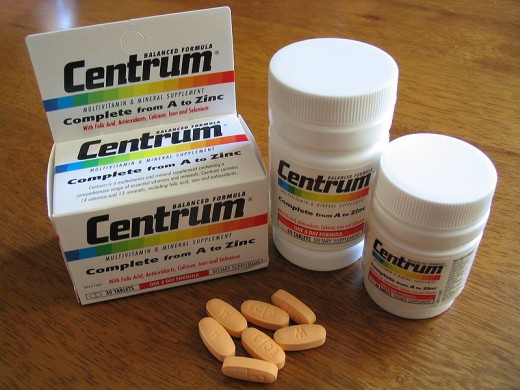Do you really need a Multivitamin?

Back in college I took a nutrition class, one thing that stuck in my mind was the idea that most healthy, well-fed Americans don’t need to supplement their diets with vitamins. To prove the point the professor had each person in the class enter their day-to-day dietary consumption into an online nutritional assessment program. Now I am happy to report that 30-something year old me eats a much more varied, healthy diet than 20-something year old Leah. Despite my lack of nutritional success in college, it turned out I was getting just about enough of all the required nutrients, the only one I was a bit low in was vitamin E. My college diet included a lot of pasta, cereal, cold cut sandwiches, and pizza. Fruits and vegetables were not a prominent feature. This well illustrated point has always stayed with me-Americans over-consume and for the most part, are getting our daily value of vitamins and nutrients within our diets.

But lately there has been an emphasis on taking multivitamins and nutrients and it seems a lot of people are buying into this. Walk into any of the retail pharmacies and you’ll see an aisle full of vitamins and supplements. This industry was estimated to rake in around 36 billion in annual sales as of 2014 in the US. So the question on my mind is do people need to take multivitamins in addition to their plentiful diet?
First question is why. Are you taking a multivitamin to supplement a lack in your diet or are you taking it to prevent disease? The focus of this article is on the former but let's briefly touch on the latter.
A systematic review is a study that pools all the research on a given subject to provide a summary, taking into consideration the quality of the research conducted. A meta-analysis often accompanies a systematic review. It is a new analysis of this pool of data.
Dietary Supplements and Disease Prevention
There have been plenty of studies done trying to determine if dietary supplements ward off disease. A systematic review and meta-analysis conducted in 2017 summed up the field of dietary supplements and disease prevention with a lot of maybes and conflicting data. The discussion in the article is full of statements like 'Folic acid might decrease cardiovascular disease risk' and 'Vitamin A might increase your risk of mortality.'
Disease prevention via vitamin supplements is, at best, not locked down. At worst-taking too much of certain vitamins can be bad for our bodies. The old adage 'too much of a good thing' has been established for several.The United States Preventative Services Task Force (USPSTF) issued a statement in 2014 advising against the supplementation of vitamin E (and beta-carotene). This statement also summarizes supplementing for cancer or cardiovascular disease prevention to be inconclusive as of 2014 based on research review.
To Supplement or not to Supplement?
Is it necessary to take a multivitamin?
As with any medical question, it depends on who you ask. Mark Hyman wrote in the Huffington Post that multivitamins are a great way to supplement one's life and diet these days since we are faced with the current environment coupled with the way food is prepared, preserved, transported, and stored before it gets to our mouths. Plus there's lack of sleep, exercise, fresh air, and clean water supply to factor in. Hyman screened the audience members of Dr.Oz's show on a particular taping and found a lot of nutritional deficiencies among the crowd. But again my question remains, do most people really need a multivitamin? Or would single agent supplements tailored to an individual be better?
The Center for Disease Control (CDC) reported in the Second Nutrition report, based off of their ongoing NHANES (National Health and Nutrition Examination Survey), deficiencies in the US from 1999-2006 varied by gender, age, and ethnicity. They found that in a given population as many as one-third could be affected by a nutritional deficiency. The major vitamins cited as deficient in the study population are B6 and vitamin D. The NHANES looked at biochemical indicators as well as blood and urine samples in their study population of around 10 thousand people and saw that B6 deficiency was seen in about 10% of their study subjects, while around 8.1% of the overall study pool had Vitamin D deficiency. But this is only two vitamins. Multivitamins contain all major vitamins in whopping doses.
One thing stuck in my mind from my nutrition course in college, is eating whole foods themselves that contain these essential vitamins is best. I have back-up on this, in the form of the 2015-2020 Dietary Guidelines for Americans. These guidelines advise us to consume vitamins and minerals in their natural food form. This is optimal since the food item contains other components, dietary fiber to name one, and this is how nature intended them to be eaten.
In the charts below you will find the major food sources for the vitamins. Also the main functions, and what comes of having too little or too much of each vitamin in your diet.
Fat Soluble Vitamins
Vitamin
| Function
| Food Source
| Too Little
| Too Much
|
|---|---|---|---|---|
Vitamin A
| Vision, Skin Health, Immune Function, Reproduction
| Sweet Potato, Beef Liver, Dark Leafy Greens, Cantaloupe, Apricots
| Blindness, increased chance of Viral infection
| Fatigue, Jaundice, Vomiting, Nausea, Anorexia, Irritability
|
Vitamin D
| Bone Health, Muscle Strength, may protect against Cancer and Type two Diabetes
| Fish-Liver Oils, Fatty Fish, Mushrooms, Egg Yolks, Liver
| Bone diseases such as fracture, Cardiovascular Disease
| Hypercalcemia, Confusion, Anorexia, Vomiting, Polyuria, Muscle Weakness
|
Vitamin K
| Blood Clotting
| Green Leafy Vegetables-examples Kale and Spinach
| Anemia, bruising, bleeding of gums or nose
| No adverse effects reported
|
Vitamin E
| Antioxidant role- may protect against Heart Disease and Cancer
| Nuts, Sunflower Seeds, Wheat Germ
| Infection, Anemia, Stunted Growth
| Hemorrhage
|
The distinction between water and fat soluble vitamins is important to this discussion. Water soluble vitamins are use it or loss it vitamins, that is when you ingest the vitamins your body either immediately puts them to work if needed or excretes them in urine if they are not needed. Particularly with this class of vitamins taking a supplement can be a waste of money if you are already getting sufficient amounts from your diet. Now fat soluble vitamins are a different story, your body can store them so you can stash these four in your body if you are taking a vitamin supplement. But be warned, since your body can store these vitamins it can also overdose on these ones. So again, if you are getting enough of these in your diet you probably don't need to supplement with them and if you over-supplement there are consequences.
Water Soluble Vitamins
Vitamin
| Function
| Food Source
| Too Little
| Too Much
|
|---|---|---|---|---|
Vitamin C
| Connective tissue health, wound healing
| All fruits & vegatables- cantalopue, citrus fruit, brussel sprouts
| Anemia, Increased risk of Infection, bleeding gums and/or nose
| Diarrhea, upset stomach
|
B1- Thiamine
| Muscle contraction and nerve conduction
| Whole grains, pork, seeds, nuts
| Headache, nausea, fatigue
| May cause upset stomach
|
B2- Riboflavin
| Antioxidant, iron metabolism
| Milk, yogurt, spinach, broccoli
| Fatigue, stomach problems, mouth and throat irritation
| Itching, numbness
|
B3-Niacin
| Converts carbohydrates to glucose,energy in the body. hormone production
| Turkey, Tuna, Chicken, Mushrooms, Seeds
| Pellagra- a disease with skin rash, diarrhea, and dementia
| Liver Damage, Peptic Ulcer
|
B5-Pantothenic Acid
| Red blood cell production, hormone production
| Corn, Broccoli, Tomatoes, Beef
| Insomnia, fatigue, irritability
| May cause diarrhea or an increased bleeding risk
|
B6-Pyridoxine
| Neurotransmitter production, myelin formation
| Chickpeas, Chicken, Bananas, Tofu
| Peripheral neuropathy, anemia
| Sensory Neuropathy, Loss of control of body movement
|
B7- Biotin
| Aids in fatty acid and amino acid metabolism
| Avocado, Raspberries, Cauliflower
| Dry skin, fatigue, loss of appetite
| None reported
|
B9- Folic Acid
| Brain function, growth, Aids in DNA/RNA production
| Spinach, Beets, Beans, Whole Grains
| Growth disruption, gingivitis, shortness of breath
| Skin reactions, sleep disruption, upset stomach
|
B12- Cobalamins
| Nerve cell health, aids in DNA and RNA production
| Fish, Dairy Products, Beef
| Fatigue, shortness of breath, diarrhea
| None reported
|
Note: Since these vitamins are water-soluble and are quickly excreted in urine, it is difficult to have too much of these vitamins.
Also note that the B vitamins collectively function in converting dietary carbohydrates into glucose
The major difference between ingesting pill form of vitamins versus getting them from your food is the pill form has to disintegrate in order for the components to be absorbed. This is a timed event, the pill form has to disintegrate within around 20 minutes in order for absorption of the nutrients to occur. Factors associated with disintegration include the non-nutritive ingredients, things that are added to the supplement to aid in swallowing, palatable, shelf-life and even appearance of the supplement. For more on different formulations of supplements check out this informative blog post on All Star Health.
Studies to examine disintegration time use the 20 minute time frame and set up an in vitro simulation of intestinal fluid with pH at physiological level.
The question to ask is does your multivitamin disintegrate in time for your stomach to absorb it. Getting the answer to this question is tough. Over the counter dietary supplements are not regulated by the FDA. Instead several nongovernment organizations, USP (United States Pharmacopeial Convention) is the most known one, test the quality of supplements. Disintegration is one measure utilized to gauge the quality, along with ingredient verification and dosage. The problem is these organizations test a very small amount of these products. Here's a primer on the organizations and what they do from an independent source, Consumer Reports.
Warning: Do not take Health advice from a fictional character on television, even one as smart as Sheldon.
An FDA sponsored site that allows you to input your daily foods. Under the 'Nutrient Info' tab you can see how much of your daily value of the essential vitamins is obtained from a given food.
I’ve been writing articles on Hubpages for some time now and it has allowed me to develop my voice, firming up my opinion on certain aspects of life pertaining to science. I am a big advocate of people doing their research. And one blurb in a health magazine or popular periodical doesn’t count. Do your homework. Look for credible sources, unbiased opinions based on real research.
For this discussion on vitamins, track your diet. Do you think you need to supplement a particular vitamin in your diet? Why? What foods contain that vitamin? Are you eating an appropriate amount of them most of the time? Be sure to consider fortified foods in your diet, foods that do not naturally contain a nutrient but have it added in. You could even schedule an appointment with a nutritionist and have them do a dietary analysis like the one I did in college. Don’t just take a supplement because ‘they’ say you should. Because here’s the deal-vitamins can be a huge waste of money if you don’t need to be taking them. And more importantly too much of a good thing can be bad for your overall health.

Always inform your doctors of any and all supplements you are taking.
Do you need a multivitamin? Probably not. As long as you don't belong to a special population such as pregnant women or elderly people. Pregnant women benefit from a multivitamin containing extra folic acid and DHA. Elderly people generally benefit from a multivitamin because as we age, we absorb less efficiently.
Sure you may be ingesting an inadequate level of a given necessary vitamin but the chances that your diet is so lacking in all the major ones that you need to supplement with a multivitamin is pretty slim. On the other hand you may have a specific, individual vitamin deficiency. Take a long look at your regular food intake over at least a few weeks time, see if you are skipping out on a food or group of foods for a particular vitamin in the charts above and if you are, supplement with that one only.








